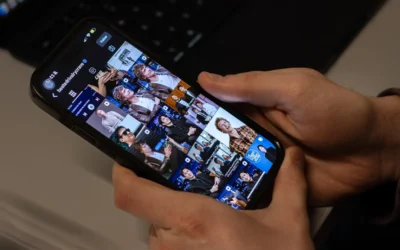Productivity is a good thing, right? After all, there are always assignments to finish, discussion forums to fill out, exams to study for, and a winding to-do list that stretches on and on and on.
Our society is bombarded with messages about productivity: “How to stay productive when everyone is demanding your attention” (Kathryn Vasel, CNN), “18 Habits of Highly Productive People” (Benjamin Elias, Active Campaign), and “The go-to productivity tips of efficiency experts” (Jen O’Brien, CBC).
But while productivity is beneficial in small doses, excessive productivity, also known as toxic productivity, can cause intense stress and burnout.
“Productivity in and of itself is really important,” says Craig Gnauck, a registered psychologist with MacEwan Wellness and Psychological Services. “We all need to feel productive (and that) there is value to what we’re doing….There are a lot of good things (about productivity), it’s just a matter if it becomes too much and too debilitating.”
“We’ve got this added dimension as productivity as a form of competition and expectation,” continues Gnauck, “and I think that’s when it starts to drift into becoming a toxic culture of productivity…. It’s no longer about anyone’s personal work ethic, their values around work, or the levels of achievement to which they are ascribing. Now it becomes a layer of expectation imposed on them. This is when good enough isn’t good enough.”
Gnauck explains that productivity culture started in the business community where it was designed to optimize the productivity of workers to ensure the business would be viable.
But having the same attitude toward productivity in our personal lives isn’t useful. It’s impossible to go through life and constantly excel. “The brain needs a time out,” says Gnauck. “The brain needs to be able to have fun, enjoy, think of things, process things that are not taxing, to actually do something that’s enjoyable.”
Creating a work-life balance, or even an approximation of one, is important. Sure, this might be impossible during exam periods, but it might be helpful to re-evaluate the rigidity of your expectations. “Folks are pushing themselves to do more, to do better,” says Gnauck, but the mindset that excelling is the only option can be very damaging and lead to physical symptoms, like nausea, chronic stress, and chronic headaches.
Toxic productivity was on the rise even before the pandemic, according to an article by Kaitlyn Miller in The Grey Journal, but lockdowns and work-from home orders made it easier for toxic productivity to seep into every corner of our lives.
Instead of taking the extra time at home for self-care, we turned to new hobbies, baked loaf after loaf of sourdough bread, built ourselves garden sheds, and generally compared our productivity to what other people were posting on social media.
Part of the issue is that productivity and the absence of leisure time is viewed as a status symbol in our society, according to a Columbia University study by Bellezze, Paharia, and Keinan.
“Productivity is the currency by which we measure our own self-worth,” said Anat Keinan, an author of the study on status and business, in a Vox article. “We know it is impossible to maintain a normal level of work productivity during (the pandemic), but for some reason we feel like a failure when we are unable to productively accomplish all (our) goals.”
Productivity has also seeped into our leisure time, and “there is growing pressure to spend our free time in productive pursuits,” according to a Fast Company article. Even self-care activities like meditation are marketed as important because they will improve productivity, not because they are important for our mental health.
Toxic productivity has always been an issue in post-secondary institutions, says Gnauck, and he is unsure if this will change any time soon. “I think (toxic productivity has) been around for such a long time, especially in post-secondaries, that I don’t know necessarily if it will be reduced…. It almost seems as though there has to be some cultural shift and rethinking of work ethic and as well, a loosening up of expectations.”
Gnauck also notes that “there has to be some renegotiation, a rethinking and normalizing that it is quite OK to take time out, to take care of yourself rather than thinking this is just about studying all night or spending 24 hours in the library during exam period.”
“It’s nice that the resource is available,” says Gnauck with a laugh, “but again, the whole idea here is what idea is it encouraging?”
Students often have more at stake than simply a grade on an assignment: there’s graduate school to consider, scholarships to apply for, and portfolios to build. This can push students even harder, especially in their third and fourth years, says Gnauck, but it doesn’t mean that students have to push themselves
to intense, perfectionistic levels, either.
Gnauck suggests looking at quality time over quantity time. An hour of focused work can be more successful than four hours of stress-induced work where you go above and beyond the requirements for the assignment.
“What’s funny about toxic productivity is that it exists more in our heads than in our actual work environments,” says Laurie Ruetti mann, the author of Betting on You: How to Put Yourself First and (Finally) Take Control of Your Career in a HuffPost article. “In other words, there are very few bosses out there
who care if you’ve been working hard around the clock.” The same is true for professors. All that matters is if the assignment is complete, on-time, and coherent, not how much extra work you put into it.
Failure is part of what perpetuates toxic productivity. “The risk of guilt is big,” says Gnauck. “And people (feel) guilty that they didn’t live up to their task list of the day and (that) consequently, they failed.”
Gnauck suggests flipping this guilt around: “Rather than looking at what wasn’t done, look at what was done and also consider how much time, effort, and energy was invested in each of those check marks.”
It’s important to recognize how toxic productivity is disrupting your daily routines and social relationships. “Pay attention to the feedback that you’re getting from family and friends,” says Gnauck. If family and friends are saying “Why don’t we ever see you anymore?” you know that your “productivity” might be going too far. It’s easy to discount their comments and say, “I’m just really busy,” or “I only have one more assignment to work on,” but the honesty of family and friends can be a big indicator that your productivity is becoming toxic.
Think about where you are investing your time. What do you want to spend more time on? What can do with a little less of you? Is there an activity that you don’t have to do at all? After all, energy isn’t bottomless. “I always encourage people to think of their energy like a gas tank. If your needle is riding, you’re
going to be riding on fumes, so there are consequences to pushing when your energy is already low,” says Gnauck.
It’s easy to tell ourselves that we aren’t doing enough. It’s harder to say, “No, I’m going to put myself first.”
Next time your friends tell you that they only got four hours of sleep last night, don’t respond, “Well, I only got three hours.” Instead, you might want to reevaluate why you only got three hours of sleep, and where you really want to spend your time.
Be kind to yourself and remember that sometimes, good enough really is good enough.





0 Comments